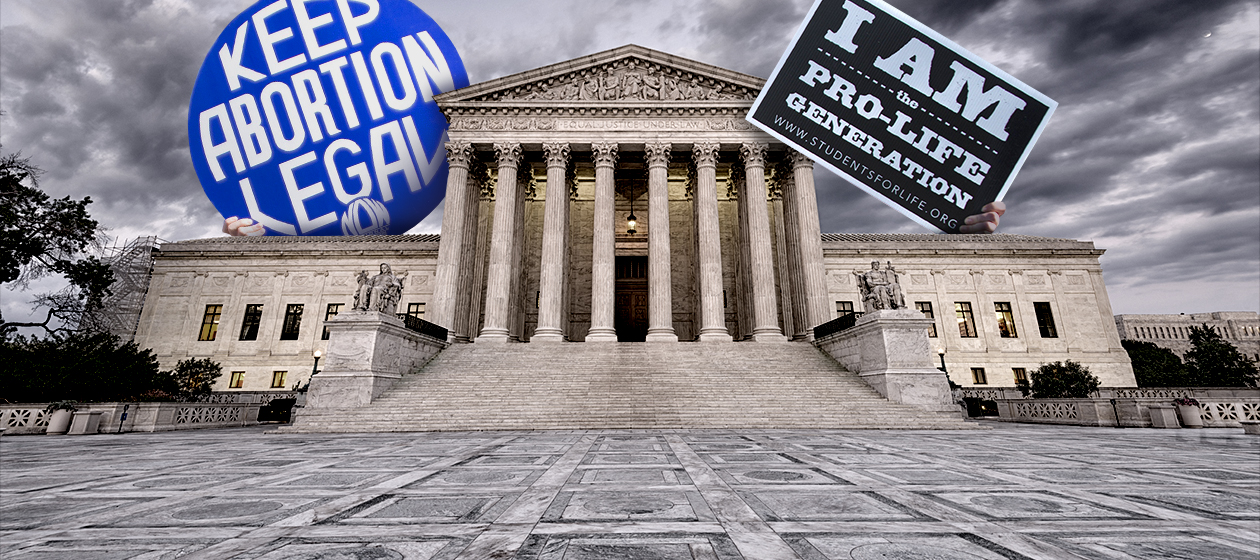I'm a pro-life woman. But I'm worried about a post-Roe America.
This isn't going to be easy — for anyone


A free daily email with the biggest news stories of the day – and the best features from TheWeek.com
You are now subscribed
Your newsletter sign-up was successful
As an American woman, I have for my entire life been assured of a legal right to procure an abortion. Not once but twice, the highest court in the land has affirmed my "right to choose" whether or not to continue an existing pregnancy. Now, suddenly, it is genuinely possible that this reality may change, and that abortion law may be returned to the states while I am yet in my childbearing years. It's a terrifying prospect.
To be clear, I'm not concerned about my reproductive rights. As an orthodox Catholic and committed pro-lifer, I want restrictive abortion laws, of a sort that can afford real protections to our society's most vulnerable human beings. I believe Roe v. Wade and Casey v. Planned Parenthood need to be abandoned. Roe is a jurisprudential train wreck that has done more than any court ruling in recent history to undermine our government's proper separation of powers. It needs to go.
Nevertheless, I tremble a bit in contemplating a post-Roe world.
The Week
Escape your echo chamber. Get the facts behind the news, plus analysis from multiple perspectives.

Sign up for The Week's Free Newsletters
From our morning news briefing to a weekly Good News Newsletter, get the best of The Week delivered directly to your inbox.
From our morning news briefing to a weekly Good News Newsletter, get the best of The Week delivered directly to your inbox.
Both the left and the right may face a hard reckoning once abortion is returned to state legislatures. For more than four decades now, Roe (later updated by Casey) has stood as a fixed landmark in our ever-shifting political map, providing a secure navigation point for strategists across the spectrum. These rulings were not, as some like to suggest, "a compromise." But they were decreed by our highest (unelected) court, and for that reason they've offered security for politicians, who've been free to adopt uncompromising positions without worrying about accountability. Fierce opposition to permissive abortion laws has kept many right-wing voters loyal to the Republican Party, while the Democrats continue to galvanize left-wing voters with the fearful prospect of losing Roe. The issue remains politically potent, but after several decades of this we seem locked into a strangely retro conversation about it, still clustering anxiously around the old memes of "right to life" and "right to choose." Nuance and compromise just became too risky, given the larger political imperative to keep the team together.
If the Supreme Court ditches Roe and leaves abortion decisions to the states, politicians might find to their discomfiture that they are able and expected to fight over a newly expanded battery of real policy initiatives. To fight these battles strategically, both left and right will need to come to terms with the ones that they have lost in the years since Roe.
On the left, the hardest truth is this: Most Americans simply have not been persuaded that women have an absolute "right to choose." Most seem to view it as a morally serious thing requiring a morally serious justification. Twenty-nine percent of people believe abortion should be legal in all circumstances and 18 percent say it should be banned outright — but a full 50 percent believe abortion should be allowed only under certain circumstances. It matters to people whether a pregnancy is in early or late stages. It matters whether mother and child are healthy, and whether the woman was raped. For a certain sort of feminist, it is axiomatic that the consequence of sex, like sex itself, should be continually subject to the woman's consent. That view seems to be the most influential within the Democratic Party, but the bulk of the public just isn't buying it, whether you're "shouting your abortion" or referring in Orwellian fashion to "reproductive health care".
Looking over the survey data, it seems that most people would prefer to see some balancing of maternal and fetal interests. It's wrong to reduce women to mere gestation-machines, but it's also wrong to subordinate the child's very life to subjective maternal whims. If properly motivated, Democrats might back away from their absolutist extremes, and instead explore some of the middle ground that we see embodied in European law. In broad form, they would likely end up arguing that abortion should be readily obtainable in the early stages of pregnancy, with restrictions becoming more stringent as a pregnancy advanced. That position would bring them much closer to the views of most Americans. But it would enrage many of the left's own activists, who are incensed by the suggestion that a woman should ever be obliged to carry and bear a child against her will.
A free daily email with the biggest news stories of the day – and the best features from TheWeek.com
The right faces a different set of challenges. For decades, pro-lifers have kept their movement alive with a laser-like focus on the value of unborn life. That strategy has been quite effective from 1973 through the present, but in the heat of controversial legislative battles, it may not work anymore. Faced with the real-world prospect of stringent abortion restrictions, the public will demand more detailed explanations of how it can be reasonable to ask women to carry such heavy burdens, when men are literally never expected to do the same.
Fifty years ago, conservatives had answers to those questions, which rested primarily on two central pillars: traditional sexual morals and traditional gender roles. Sex should be reserved for marriage, and women should orient their adult lives around childbearing and its attendant obligations. In a different time and culture, these traditional mores were reasonably effective at ensuring that children were conceived with a pre-designated breadwinner, caretaker, and natal family. Even today, some families and communities embrace this approach, but it's obviously countercultural in the 21st century. Mid-20th-century gender roles have proven unsustainable as a norm in a society that attaches such rich rewards (money, social respect, opportunity) to professional achievement. It just doesn't seem fair to ask women to forego so many opportunities, simply because they have wombs.
Pro-lifers won't make much headway legislatively if they get backed into arguing that women are obliged to choose between full-time domesticity and lifelong celibacy. Realistically though, all of the alternatives will be hotly controversial on the right. Artificial contraceptives could be recommended as an increasingly promising method of minimizing unplanned pregnancies, but that will displease the many religious conservatives (such as myself) who have ethical objections to contraceptives, and who worry about the likely ramifications for marriage and birth rates if long-acting contraceptives are more widely distributed. Another possible solution would be a more generous family policy (also reminiscent of Europe), which could help offset the financial burdens of parenthood while providing more social support for mothers. This too will be fiercely controversial among conservatives, who dislike entitlements and especially hate subsidizing female careerism.
For nearly half a century, abortion has been enshrined by our courts as a constitutional right. What will happen to our society if that ceases to be true? It may further destabilize an already volatile political landscape. At the same time, even liberals should reflect that there is potentially much to be gained here. For a long time, Roe has been an obstacle to serious public deliberation about the real needs of women, children, and families. It's time for that conversation to begin.
Rachel Lu is a writer based in Roseville, Minnesota. Her work has appeared in many publications, including National Review, The American Conservative, America Magazine, and The Federalist. She previously worked as an academic philosopher, and is a Robert Novak Journalism Fellow.
